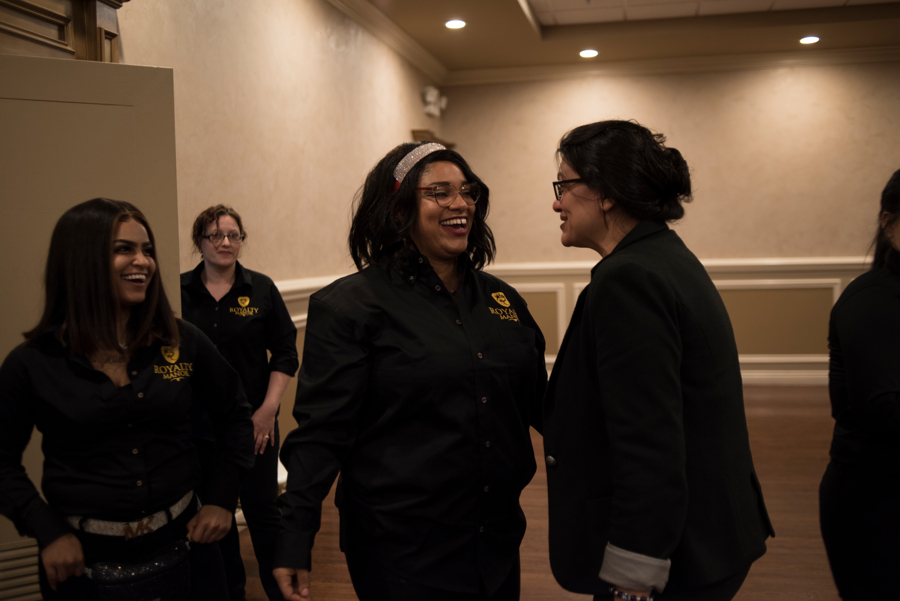I spent a day with Rashida Tlaib
Photographers Eric Howard and Rosa Maria Zamarron were there too.
We were there for In These Times, a socialist magazine out of Chicago.
Now, I’ve known of Rashida since I first started visiting Detroit regularly in 2011. I got to know her better when I lived there–not personally, but importantly, through her neighbors: The people who grew up with her in Southwest Detroit and neighboring Dearborn.
I have spent my life learning about different places, and the quickest way to understanding a place and to becoming a “Detroiter” or a “New Yorker” or “Bostonian” or anything is through the people that make the place what it is. There is a learning curve involved, but once you get it, you’ve got it, and the people will embrace you as one of their own. That’s how humans have lived for thousands of years, and all the tech in the world will not change it.
Being considered a “Detroiter” carries with it a responsibility: To defend her people, to lift up their voices, and to alleviate some of the crushing weight of greed and oppression that torment the souls Detroit keeps in her orbit.
And that is what Rashida Tlaib does. I didn’t learn that from developing a deep relationship with her; I learned it from taking the time to listen to the people who know her in her community. They love her. They usually agree with her. They always, and all, know her spirit, they know her soul, and they know her intention. They know it is sincere, and they know they can trust her. Even her critics in Detroit are holding their breath, hoping she can accomplish something for them. For Detroit.
Detroit is a hard city to cultivate that kind of reputation and familiarity, trust and hope. These are suspicious people (for good reason) with long memories; they remember each grievance, and here, in the belly of an industrial catastrophe, there are many.
So, it is with some sorrow that I watch as people who have never met Rashida, who only know her through the eyes of the internet or television, not only pass hateful judgement upon her, but upon her children and her people. Her constituents. Detroit’s children.
The story I wrote for In These Times, with lovely photography from Erik and Rosa, shares a slice of the reality of Detroit, of her district. This is a diverse, working class community. It is not a religious block. The vast majority of the people who voted for Rashida are not Muslims. They are people who know her. Who trust her. Who are cheering her on as one of their own.
That’s what I see, and that’s what I saw that day I spent with her.
If you think you know her from FOX News or from the Internet, please take a moment and consider this:

Rashida Tlaib reads the book Grace for President to children at a Día de los Niños event at a park in Southwest Detroit while on a district visit April 27.
Rashida Tlaib May Be Under Attack By the Right, But She’s Beloved in Her District
In These Times spent a day with Tlaib in Detroit.
On May 15, Palestinian American Rep. Rashida Tlaib (D-Mich.) became the first Muslim woman to preside over the House floor. Three days earlier, House Rep. Lee Zeldin (R-N.Y.) egregiously mischaracterized Tlaib as saying she gets “a calming feeling” from thinking about the Holocaust; the GOP and the president soon piled on. In fact, Tlaib had expressed a completely different sentiment: that she finds some solace in the fact her Palestinian ancestors were displaced “in the name of trying to create a safe haven for Jews, post-the Holocaust, post-the tragedy and the horrific persecution of Jews across the world at that time.”
Tlaib stood firm, tweeting, “Policing my words, twisting & turning them to ignite vile attacks on me will not work. All of you who are trying to silence me will fail miserably. I will never allow you to take my words out of context to push your racist and hateful agenda. The truth will always win.”
“It’s annoying—they took it out of context,” says Gabriela Santiago-Romero, 27, a 13th Congressional District constituent who lives in Southwest Detroit. “It’s twisting it around. Her representation is spot on. If she makes a mistake, she admits it. I love Rashida.”
“This is what we’ve been calling ‘the weaponization of anti-Semitism,’” says Rabbi Alana Alpert of Congregation T’chiyah and Detroit Jews for Justice, another constituent. “The GOP doesn’t care about Jews—if they did they would fight the real threat we are facing: the rise of white nationalism which their President is certainly enabling. It’s an incredibly cynical move, twisting the Congresswoman’s words. My family, and every Jew I know in her district, are proud to be her constituents. We are grateful to have someone in Washington fighting for us and our neighbors on health, environment and economy.”
Tlaib’s history as a rabble-rouser starts in metro Detroit, where she was known for driving around with a bullhorn and parking in front of the region’s worst polluters, such as the Marathon Oil Corporation, to call out their records of environmental harm. Now, she’s better known for yelling “Impeach the motherfucker!” after her congressional swearing-in in January.
Tlaib’s language—tweets, no-nonsense straight talk, curse words and all—is reflective of her constituents in her metro Detroit district. Michigan’s 13th District is working-class, with a median income of $35,500, and diverse: 56% black, 37% white, 7% Latino and 1% Asian. This multi-ethnic group has worked together on factory lines and organized together in various unions for generations. Tlaib is one of them, raised in the shadow of auto factories and heavy industry by working-class, Palestinian immigrants. Tlaib was the first in her family to graduate high school and college.
But Tlaib’s outspokenness on subjects from working class and labor issues to immigration, which helped get her elected in this corner of Michigan, has sent a certain segment of America into a tizzy. As of April, Tlaib’s office had reported over 100 credible threats to her life. On average Tlaib’s office receives 40 to 50 negative calls a day from outside the district. The calls from around the country are “often not based in reality,” but spurred by “baseless attacks on rightwing blogs,” says communication director Denzel McCampbell. Some days the numbers skyrocket, and the main office calls the comms teams to find out what happened—the answer inevitably being that Tlaib had been featured in a new right-wing blog post or on FOX News.
While the Right has done its best for months to soil her name on the national stage, in her district, she is just Rashida—everyone knows her, and she knows them. That’s what In These Times saw during a day of shadowing Tlaib on a district visit on April 27.
When we meet up on a Saturday morning in late April, Democratic Rep. Rashida Tlaib is just off a red-eye flight with only two hours of sleep. She sits on a curb in front of Avalon Bakery in Detroit’s old Cass Corridor neighborhood, waiting to read The Lorax, Dr. Seuss’s fable about corporate greed and the environment, to a small group of families—white, African American, Arab American. Some of the children recognize Tlaib from her visits to their classrooms. “Do you know what impeachment is?” she asks them. The parents laugh, and Tlaib explains she likes to include kids in the dialogue.

Tlaib’s reading of The Lorax is peppered with commentary. “Sir, you are crazy with greed!” she reads, then adds, “I know a lot of people like that,” to knowing laughs from the parents—constituents familiar with the greed of the region’s big corporations, from the auto industry to the oil industry to billionaire bridge owner Manuel “Matty” Moroun (who received free giveaways of public land in several development deals). Heavy industrial pollution in Detroit has caused the highest asthma rate in Michigan.
“Greed,” Tlaib tells the crowd, “is dangerous.”
“My job is to help you,” Tlaib says to the children at the end of reading. “Your job is to call my office and tell me what you need.” All constituents should be calling their reps, she says, and don’t do so enough. She also asks the children, if they had her job, what laws would they pass? One says that it should be illegal to buy auto and semi-automatic weapons in Michigan, and that police should only be able to use them in emergencies.
This, Tlaib tells In These Times, is “therapy”—how she deals with the hate coming at her and stays grounded. She comes back to her district every weekend to spend time with the people here. She also gives enormous credit to her team, many of them Detroiters she’s known for years, who shield her from incoming comments and messages from outside her district, and use humor to lighten up what would otherwise be a crushing weight of hate. She is far from insulated, though: She manages her own Twitter account. The week before, at Easter, she was barraged with messages including crude references to pigs, ham and pork.
Over the course of the day, none of her constituents bring up her faith. In this part of Michigan, Muslims have been part of the blue-collar workforce for multiple generations.
After the reading, inside the bakery, an elderly African American and white woman approach her to brag that they made their own “Impeach the motherfucker” pins. They ask Tlaib how she’s doing, with a slight note of concern. “I’m blessed,” she responds. “Very, very blessed.”
From Avalon Bakery, Tlaib runs errands for her family, picking up food for a party and gifts for a family member, before meeting In These Times just 45 minutes later at a park in Southwest Detroit for the Día de los Niños (Children’s Day) event. The neighborhood is predominantly Mexican American, and the event is filled with Mexican families, children in traditional costumes, food, music and dancing. A little girl stops Tlaib to say that her teacher didn’t believe she knew the congresswoman personally. Tlaib says, “Then we need to take a selfie to show her.” This, it seems, happens often.
Between stopping to talk to constituents, many of whom she knows by name, she picks up trash and tosses it into wastebaskets. Just across the street sit burned out homes, and the smell of heavy industry hangs heavily in the air; Southwest Detroit is near 29 industial polluters.
At the Día de los Niños, Tlaib reads aloud Grace for President, a children’s book about a young girl who learns the United States has never had a woman president and is inspired to run. One of Tlaib’s team translates into Spanish. Afterward, more constituents come to her, now with problems.

One little girl says her father was deported. “Please bring him back,” she pleads, bringing Tlaib to tears. Tlaib’s assistant gently tells her the team had been working on the issue, and Tlaib stays with the family, sitting in the grief with them. Afterward, she takes a moment to explain ICE and immigration policy to her young sons, ages 8 and 13.
Then it’s off to a family party for her nephew, before attending the Ecorse Firefighter’s River of Fire Walleye Tournament in Ecorse, a town in her district “down river.” There was 104 boats with two or three fishermen per boat, catching walleye in a competition to raise money to support residents of the town. The funds will feed families on the holidays and purchase every child in Ecorse backpacks for back-to-school.
The crowd, mostly white men, appear more like stereotypical supporters of Trump than of Tlaib. But many come up to snap pictures with her as they drink beer and she eats the fresh fried fish. Some say their wives heard Tlaib was there and texted, demanding pictures.

A few run in the other direction. “A picture with Rashida means you’re a Democrat,” one man teases. A young white man walks up to hit on Tlaib, not aware of who she is. When he realizes making moves probably isn’t socially appropriate, he walks away, saying, “Her dimples are cute.”
Another man tells her he opposed socialism and wants lower taxes and smaller government. Tlaib smiles and says to In These Times, “I like how they lobby me.”
While that conversation was good-natured, another is more challenging, when employees of a local heavy manufacturing plant come up to tell Tlaib how great their employer is, how clean and efficient and by-the-book. Tlaib runs through a litany of the plant’s well-documented environmental violations. Yet the more Rashida talks, the more they double down. Her passion is apparent, however, and the men listen with evident respect. One admits he’s never heard about the violations she’s citing.

Mark Wilson, organizer of the fundraiser, is glad Tlaib could come, and says of her political work, “So far so good.” He politely declines to comment further because, he says earnestly, “I’m not here to dislike or like anybody. We’re here to do what we do.” Raising money to support kids and families, in Wilson’s view, supersedes any kind of politics.
Next up is a drive to an orphan relief benefit gala and masquerade ball in the Arab American community of Dearborn. Tlaib learns on the way about the recent Poway, Calif., synagogue shooting, and is visibly shaken when she arrives at the ball. Amid the hub-bub of people who want her attention, she takes a moment to sit down and collect her thoughts on the shooting, and share in a tweet: “I want to cry, but too angry to let my raw emotions consume me. It’s another sacred place of worship, which shakes me, like it should our country. This is a remarkable time in our country where we must be courageous and choose to act to stop this madness.”

The waitstaff, who are African American and white, are happy to see her, reminding her of times they’ve met her in the past. Tlaib asks one server, “How are you?” and listens patiently to the answer, even as a line of people form to greet her.

As the sun sets, Tlaib drives outside her district to neighboring Livonia for a presentation on the Armenian genocide. Genocide denial “is a con game, a distraction,” says presenter Dr. Henry C. Theriault. Tlaib has co-sponsored a bill to recognize the genocide—something the United States, after over a century, has refused to do. Outside, a lone protester holds a big poster that reads: “You’re not Armenian you’re Arabs mixed with Turk.”
She walks back to her car around 9 p.m. A light rain starts to fall, and Tlaib, giddy with the energy of a long day, prepares to drive herself home, for another day with her family and her constituents.

This piece was posted at In These Times. Thank you for reading it. Please consider sharing it and making a gift in support of my work.
Thank you.
